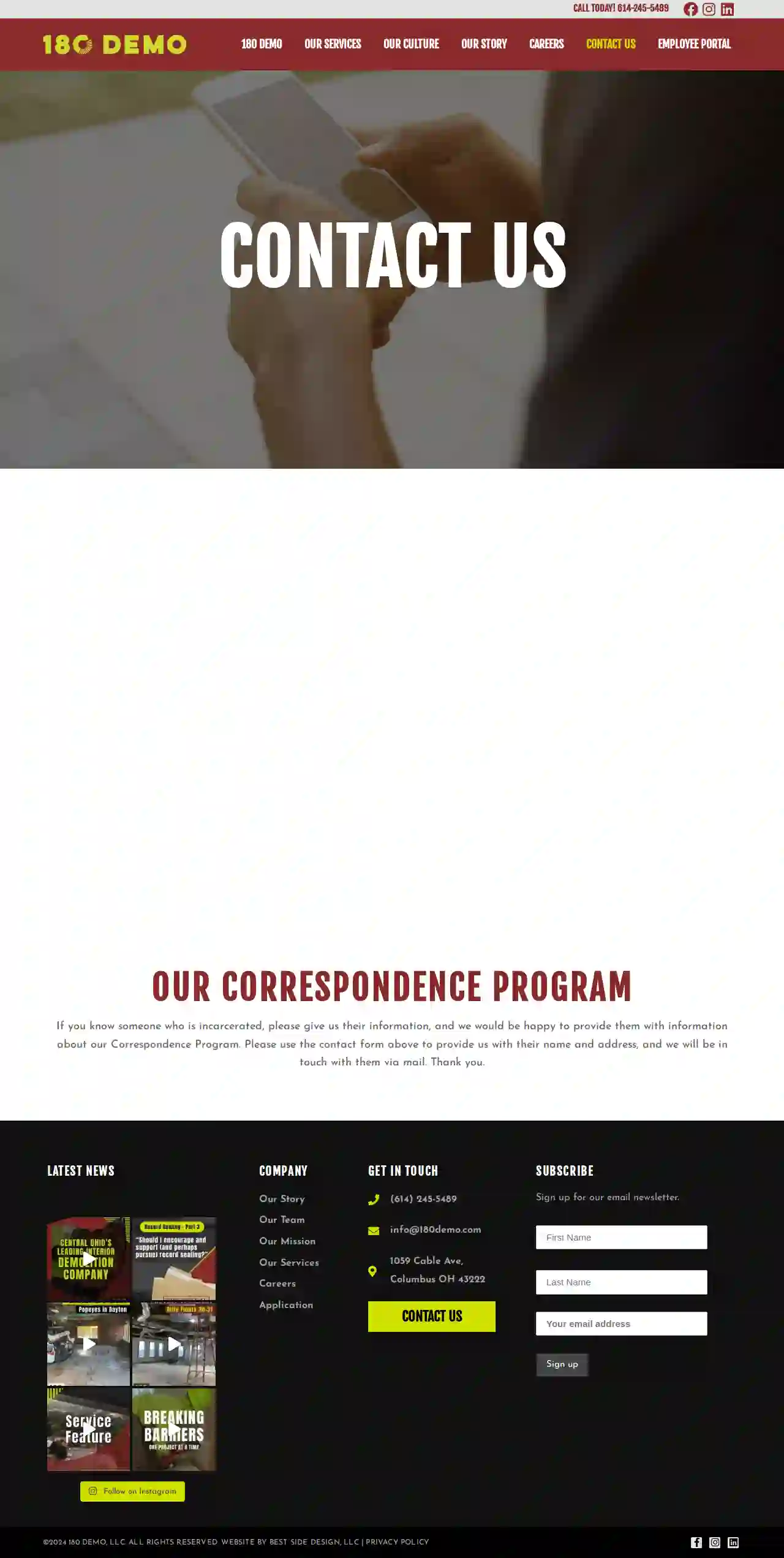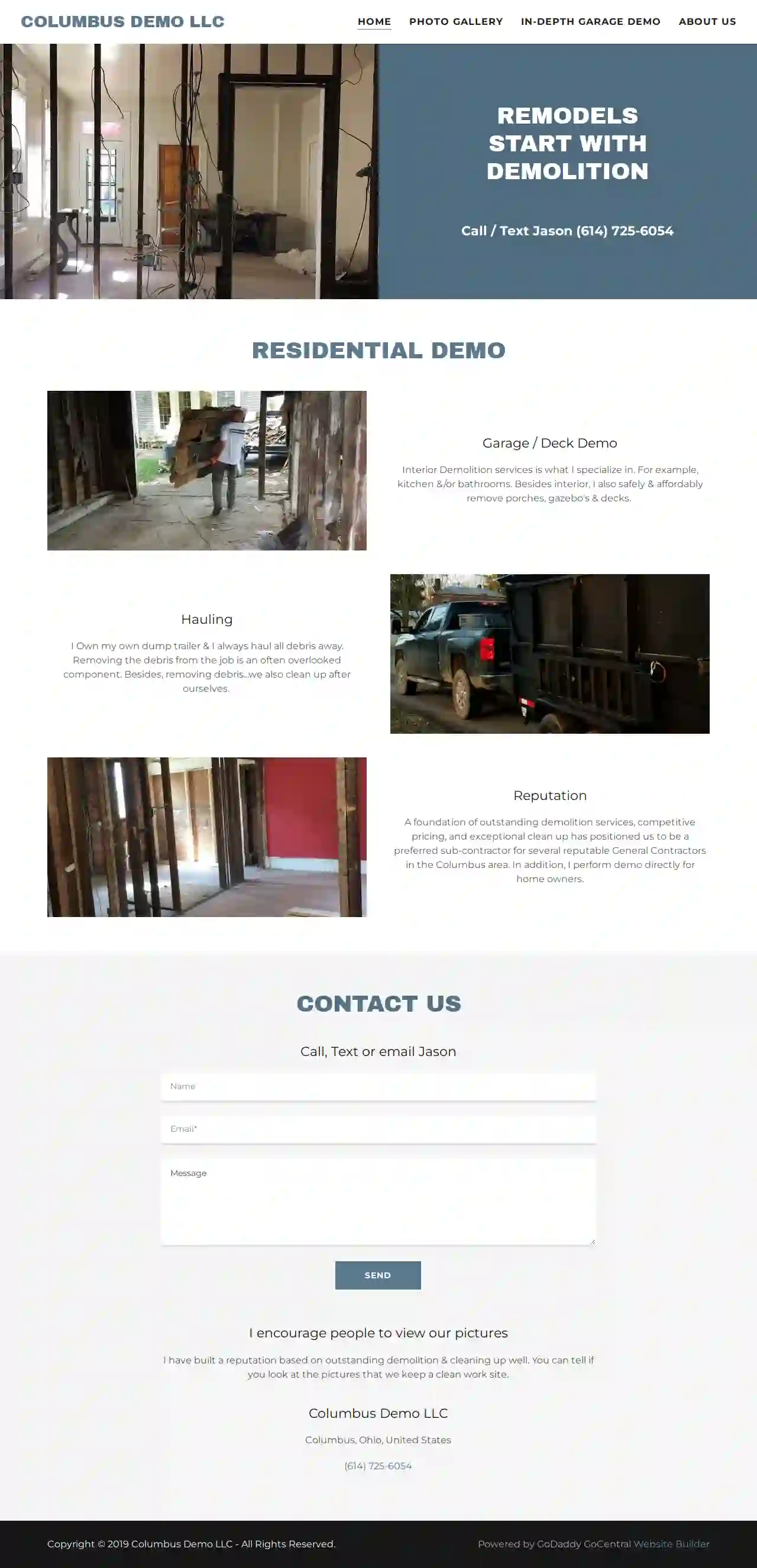Demolition Contractors Columbus
Find top Building Demolition in Columbus
Get 3 FREE Demo Companies quotes for your project today! Compare profiles, reviews, accreditations, portfolio, etc... and choose the best deal.

180 Demo
4.36 reviews1059 Cable Ave, Columbus OH 43222, Columbus, 43222, USOUR MISSION To provide general contractors with the highest level of professionalism, safety, and reliability as their demolition provider. We are creating supportive employment opportunities to prove that taking new directions is always possible regardless of a person’s past. OUR VISION WATCH: WHAT WE'RE ALL ABOUT OUR CORE VALUES SAFETY ResponsiblePreparedAware INTEGRITY HonestTrustworthyReliable COACHABILITY HumbleReceptiveCurious RESILIENCE DeterminedFaithfulFocused RELATIONSHIPS EmpatheticResponsiveCooperative PROFESSIONAL TrainedEquippedCompetent OUR TEAM JOHN RUSH FOUNDER/CEO CARL SHYE CHIEF FINANCIAL OFFICER AMBER SHOUP DIRECTOR OF HUMAN RESOURCES MATTHEW LANDEFELD LEAD ESTIMATOR ADAM DAMRON ESTIMATOR JOHN RUSH, JR. DIRECTOR OF OPERATIONS KENNETH MONTGOMERY FOREMAN ROBERT VANDERDOES FOREMAN MARQUISE MCCABE FOREMAN FILBERTO RODRIGUEZ FOREMAN JEREMY PRESTON FOREMAN MATTHEW WATTS FOREMAN TANK JONES FOREMAN MORE ABOUT A CAREER WITH US If you know someone who is incarcerated, please give us their information, and we would be happy to provide them with information about our Correspondence Program.Click here to contact us with their name and address, and we will be in touch with them via mail.
- Services
- Why Us?
- Our Team
- Gallery
Get Quote
Columbus Demo llc
52 reviewsColumbus, US- Services
- Why Us?
Get Quote- Pr
Precise Demolition and Hauling LLC
4.839 reviewsColumbus, US- Services
- Why Us?
Get Quote - Cr
Creative Destruction
Columbus, US- Services
- Why Us?
Get Quote - Co
Columbus Demolition Pros
Columbus, US- Services
- Why Us?
Get Quote - Sp
Spaulding Demolition
52 reviewsColumbus, US- Services
- Why Us?
Get Quote - SI
SITECO. Demolition
53 reviewsColumbus, US- Services
- Why Us?
Get Quote
Over 8,502+ Demolition Businesses on our platform
Our demolition companies operate in Columbus and beyond!
DemolitionMatch has curated and vetted Top Demolition Businesses near Columbus. Find a reliable contractor today.
Frequently Asked Questions About Demolition Contractors
- Planning and Permits: The demolition contractor will assess the site, develop a demolition plan, and obtain necessary permits from the local authorities. This includes ensuring compliance with building codes, environmental regulations, and safety standards.
- Disconnection of Utilities: All utilities (e.g., electricity, gas, water, sewer) will be disconnected and capped off to ensure safety during demolition.
- Asbestos Removal (if required): If asbestos is present, a certified asbestos abatement contractor will safely remove it before demolition begins.
- Protection of Surroundings: The contractor will protect surrounding structures, landscaping, and utilities from damage using barriers, fencing, and other protective measures.
- Demolition: The actual demolition work begins using appropriate methods and equipment, such as excavators, wrecking balls, or specialized demolition robots.
- Debris Removal and Sorting: Demolition debris is carefully removed, sorted (for potential recycling), and transported to an approved disposal facility.
- Site Cleanup: The site is cleaned and graded to prepare it for its intended use. This might involve filling in excavations, leveling the ground, and removing any remaining debris.
- Contains asbestos, lead paint, PCBs, or other hazardous materials.
- Is located near sensitive environmental areas, such as wetlands or water bodies.
- Has a history of industrial or commercial use.
- Structural Collapse:
- Falling Debris:
- Exposure to Hazardous Materials (e.g., asbestos, lead paint):
- Fires and Explosions:
- Equipment Accidents:
- Utility Damage:
Do I need a permit for demolition in USA?
What is the demolition process?
How do I know if a demolition project requires an environmental assessment?
What are the risks associated with demolition?
Do I need a permit for demolition in USA?
What is the demolition process?
- Planning and Permits: The demolition contractor will assess the site, develop a demolition plan, and obtain necessary permits from the local authorities. This includes ensuring compliance with building codes, environmental regulations, and safety standards.
- Disconnection of Utilities: All utilities (e.g., electricity, gas, water, sewer) will be disconnected and capped off to ensure safety during demolition.
- Asbestos Removal (if required): If asbestos is present, a certified asbestos abatement contractor will safely remove it before demolition begins.
- Protection of Surroundings: The contractor will protect surrounding structures, landscaping, and utilities from damage using barriers, fencing, and other protective measures.
- Demolition: The actual demolition work begins using appropriate methods and equipment, such as excavators, wrecking balls, or specialized demolition robots.
- Debris Removal and Sorting: Demolition debris is carefully removed, sorted (for potential recycling), and transported to an approved disposal facility.
- Site Cleanup: The site is cleaned and graded to prepare it for its intended use. This might involve filling in excavations, leveling the ground, and removing any remaining debris.
How do I know if a demolition project requires an environmental assessment?
- Contains asbestos, lead paint, PCBs, or other hazardous materials.
- Is located near sensitive environmental areas, such as wetlands or water bodies.
- Has a history of industrial or commercial use.
What are the risks associated with demolition?
- Structural Collapse:
- Falling Debris:
- Exposure to Hazardous Materials (e.g., asbestos, lead paint):
- Fires and Explosions:
- Equipment Accidents:
- Utility Damage: